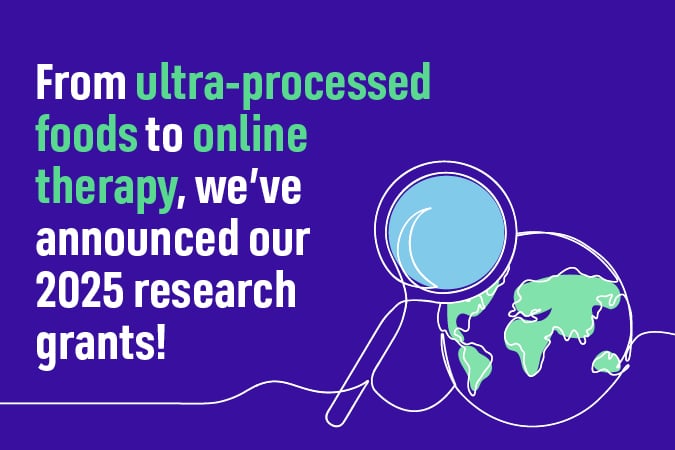Scientific abstract
Background
Worldwide, prostate cancer (PC) is the second most common incident cancer and fourth leading cause of cancer mortality in men. Although the five-year survival rate for PC is extremely high (99%), advanced PC has a markedly different prognosis with only a 34% five-year survival rate, making advanced PC the clinically relevant outcome. To date, the etiology of advanced PC is poorly understood.
Methods
To examine whether dietary factors affect the risk of advanced PC, we conducted pooled analyses of the individual participant data collected in 15 prospective cohort studies including over 840,000 men in the Pooling Project of Prospective Studies of Diet and Cancer, an international consortium.
We investigated the associations between intakes of meat, calcium, fruits, vegetables, and dairy products and risk of PC overall, by stage (localised, advanced), and by grade (low-grade, high-grade). Due to conceptual differences in the approach to defining advanced PC across investigators from the individual studies, we formulated two definitions of advanced stage PC.
One definition included men who had initially been diagnosed with localised PC who later died of PC during follow-up; the other definition did not. Study-specific analyses were conducted using uniform criteria across studies; the study-specific estimates were pooled using a random effects model.
Results
We found that intakes of unprocessed red meat, processed meat, seafood (fish and shellfish combined), poultry, and eggs were not associated with a substantially increased or decreased risk of total, localised, low-grade, or high-grade PC with pooled multivariable relative risks (MVRR) comparing the highest versus lowest category of intake ranging from 0.93-1.07 across these food groups and outcomes.
For unprocessed red meat and processed meat, marginally significant modest positive associations were observed for advanced PC but only when men who were initially diagnosed with localised PC but died of PC during follow-up were excluded from the definition of advanced PC.
In contrast, a modest inverse association was observed for poultry consumption and a modest positive association was observed for egg consumption for advanced PC only when all men who died of PC during follow-up were included as cases. There was a suggestion that the associations for unprocessed red meat, poultry, and egg consumption and risk of advanced PC were stronger in studies conducted in North America compared to Europe and Australia.
Dietary and total (dietary plus supplemental) calcium intakes were associated with a slightly increased risk of total PC but no significant associations were observed with risk of high grade, advanced stage, or fatal PC. Total fruit and vegetable, total fruit, total vegetable, cruciferous vegetable, and tomato product intakes each were not associated with risk of advanced PC.
In summary, in our pooled analyses of 15 cohort studies, calcium and fruit and vegetable intakes were not associated with risk of advanced PC. Higher unprocessed red meat, processed meat, and egg consumption were associated with marginally significant modestly higher risks of advanced PC, while higher poultry consumption was associated with a modest reduction in risk of advanced PC.
There was a suggestion that these associations varied between studies conducted in North America versus Europe and Australia. Further, it appeared that results depended on how advanced tumors were defined.
Conclusions
The implication of these findings, as well as the potential mechanisms for the associations observed, need to be elucidated.
Plain language abstract
Hypothesis
We examined associations between several dietary factors and risk of prostate cancer (PC), the second most common cancer in men worldwide. Our analyses focused on advanced PC, which has a five-year survival rate of only 34%.
We hypothesised that high calcium intakes increase advanced PC risk, total fruit and vegetable consumption is not associated with advanced PC risk, and higher cruciferous vegetable and tomato product intakes are associated with a lower advanced PC risk.
Background
Our understanding of how dietary factors influence prostate carcinogenesis is limited because the specific PC outcomes (e.g., advanced, aggressive, total) and dietary factors examined have differed across studies; thereby limiting direct comparison.
Based on existing evidence, the World Cancer Research Fund/American Institute for Cancer Research Second Expert Report concluded that diets high in calcium probably increase PC risk. The report also determined that foods high in lycopene (e.g., tomato-based products) probably decrease PC risk, although the evidence was limited for overall fruit and vegetable consumption and PC risk.
Finally, of the meat groups examined, the report concluded there was suggestive evidence of an association only for processed meat consumption.
The goal of our comprehensive analyses using standardised approaches across multiple studies was to yield the best summary of the available data on associations between these dietary factors and advanced PC risk.
Methods
We conducted pooled analyses of the individual participant data in 15 prospective cohorts participating in the Pooling Project of Prospective Studies of Diet and Cancer. Our primary analytic approach was a two-stage process: analyses were conducted in each study using standardised criteria and then those results were pooled using a random effects model.
Due to conceptual differences in how to define advanced PC, we formulated two definitions of advanced PC. One definition included men who had initially been diagnosed with localised PC who later died of PC during follow-up; the other definition did not.
Key findings
The analyses included over 840,000 men of whom over 51,000 were diagnosed with PC (included over 4,800 advanced PCs). Intakes of red meat, processed meat, seafood (fish and shellfish combined), poultry, and eggs were not associated with a substantially higher or lower risk of total, localised, low-grade, or high-grade PC.
For red meat and processed meat, suggestively higher risks of advanced PC were observed, but only for the more restrictive definition of advanced PC. In contrast, poultry consumption was associated with a lower risk and egg consumption with a higher risk of advanced PC only when all men who died of PC during follow-up were included as cases.
There was a suggestion that the associations for red meat, poultry, and egg consumption were stronger in studies conducted in North America compared to Europe and Australia. Dietary and total (dietary plus supplemental) calcium intakes were associated with a slightly higher risk of total PC but no significant associations were observed for specific PC subtypes.
Total fruit and vegetable, total fruit, total vegetable, cruciferous vegetable, and tomato product intakes were not associated with advanced PC risk.



